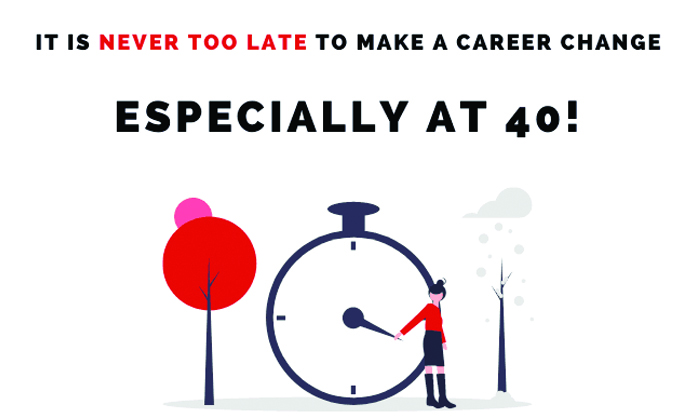Unfortunately, ageism is a reality in the workforce. Some employers may hold biases, assuming that older candidates are less adaptable or less tech-savvy. Embarking on a career for some individuals comes later in life. Starting fresh in a new industry often means competing with younger candidates who may have more relevant experience. Employers may prioritise candidates with hands-on experience in the field.
There are various reasons some careers may not kick-start as early as the 20s as some would, immediately after university.
Some resign from their jobs and pursue careers they have always wanted after some years in a different field. How does one begin a career after forty without prior experience in a particular field? This article is for those stepping into the workforce later in life or making a career shift, it’s important to understand both the obstacles and strategies that can propel you toward career success. As a career coach, at times clients worry that they have nothing to offer and feel uncertain about starting a career after 40. They also worry about fitting in, adapting to new roles, and competing with younger candidates can lead to self-doubt.
Life Experience and Maturity
Those who start their careers later in life are individuals who bring valuable life experience to the table. A recruiter may consider hiring these professionals as they have experience navigating challenges, managing relationships and dealing with various life situations. This entails that their emotional intelligence might be higher and they might have the ability to solve problems. These traits may be beneficial to the team as they contribute to workplace stability, leadership and better decision-making.
Professionalism and Strong Work Ethic
Unlike the younger workforce, older job seekers are likely to have a stronger sense of responsibility and a commitment to doing a job well. Having had more exposure to different aspects of life, they often approach work with a deeper sense of purpose and determination.
Transferable Skills
Even if one lacks direct experience in a new field, transferable skills from past roles or personal experiences such as communication, project management, teamwork, leadership and time management can be invaluable. Many industries seek individuals who can think critically, adapt to changing environments, and collaborate effectively.
Professional Network
By age 40, many individuals have built a broader personal and professional network. These connections can be leveraged when seeking new job opportunities, gathering industry insights, or getting a foot in the door.
Strategies to Propel Your Career After 40
Take advantage of online courses, certifications, and workshops to acquire new skills. Constantly upgrading your knowledge makes you a more competitive candidate. When applying for jobs, tailor your resume to showcase how your life and work experience make you uniquely qualified. Highlight your ability to lead, communicate and solve problems, even if these skills were honed outside the traditional job market.
Your personal and professional network can be a powerful asset. Reconnect with former colleagues, join industry groups, attend networking events and use platforms like LinkedIn to expand your connections. Networking can open doors that might not be accessible through traditional job boards. Demonstrating an awareness of current trends, technological developments and best practices in your chosen field will position you as a knowledgeable candidate, regardless of age. Subscribing to industry newsletters, listening to podcasts and reading relevant articles are great ways to stay informed.
Resilience is essential when transitioning into a new career later in life.
Conclusion
Starting a career after 40, especially without prior experience, may present challenges, but it also brings a wealth of opportunity.
There will be setbacks, but it’s important to remain confident in your abilities and maintain a positive outlook. Remember, this is an exciting opportunity for reinvention and growth.
By leveraging your maturity, transferable skills and existing networks, while continuing to learn and adapt, you can overcome the barriers and forge a rewarding new path. With the right mindset and preparation, the second act of your professional journey can be just as fulfilling and successful as the first. Finding a mentor in your new field can provide guidance, insider knowledge and motivation. Mentors can help navigate challenges and introduce you to opportunities you may not have been aware of.
- Lisa Matomola is a managing consultant: Hito HR, career and job finder coach
Stay informed with The Namibian – your source for credible journalism. Get in-depth reporting and opinions for
only N$85 a month. Invest in journalism, invest in democracy –
Subscribe Now!






